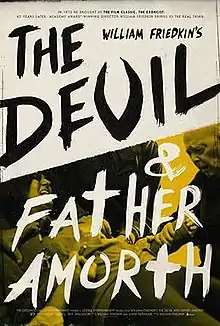The Devil and Father Amorth
The Devil and Father Amorth is a 2017 American documentary film directed by William Friedkin showing the ninth exorcism of an Italian woman in the village of Venafro[2] referred to as "Cristina", this time performed by Father Gabriele Amorth.
| The Devil and Father Amorth | |
|---|---|
 Theatrical release poster | |
| Directed by | William Friedkin |
| Produced by |
|
| Written by |
|
| Starring | Gabriele Amorth |
| Narrated by | William Friedkin |
| Music by | Christopher Rouse |
| Edited by | Gary Leva |
Production company | |
| Distributed by | The Orchard |
Release date |
|
Running time | 68 minutes |
| Country | United States |
| Language | English |
| Box office | $20,449[1] |
Production
Mark Kermode, a British film critic and long-time admirer of Friedkin, was invited to assist in writing narration.[3]
Release
The film premiered at the 74th Venice International Film Festival on August 31, 2017.[4] It had a wide release in the United States on April 20, 2018.[5]
Reception
Despite the Director's claims of having not altered any footage https://www.lifehacker.com.au/2018/10/is-the-demon-voice-in-the-devil-and-father-amorth-real/ Subsequent investigations have show the audio recording of the "possessed" was manipulated with sound effects. Vanity Fair published recordings that show the difference between the original audio and the faked audio used in the film https://www.vanityfair.com/video/watch/devil-and-father-amorth-witnessing-the-vatican-exorcist-at-work .
On review aggregator website Rotten Tomatoes, the film holds an approval rating of 44% based on 39 reviews, with an average rating of 4.88/10.[6] The website's critical consensus reads, "The Devil and Father Amorth sets out to interrogate age-old questions of faith, but fails to find enough compelling answers -- or reasons for viewers to watch."[6] On Metacritic, the film has a weighted average score of 46 out of 100, based on 16 critics, indicating "mixed or average reviews".[7]
Robbie Collin of The Telegraph wrote that the film "feels amateurish and arguably also exploitative [...] although perhaps that lends it credibility: in this context, too much polish would almost certainly be cause for suspicion."[8] Owen Gleiberman of Variety called the film "a rather tawdry charade."[9]
References
- "The Devil and Father Amorth (2018)". Box Office Mojo. November 16, 2018.
- Friedkin, William. "The Devil and Father Amorth: Witnessing "the Vatican Exorcist" at Work".
- "Kermode Uncut: Talk Of The Devil". Retrieved Sep 23, 2019 – via www.youtube.com.
- "William Friedkin on Twitter".
- Collis, Clark (April 19, 2018). "The Exorcist director films 'real' exorcism in clip from The Devil and Father Amorth". Entertainment Weekly. Retrieved September 14, 2019.
- "The Devil and Father Amorth". Rotten Tomatoes. Fandango Media. Retrieved September 14, 2019.
- "The Devil and Father Amorth". Metacritic. CBS Interactive. Retrieved September 14, 2019.
- Collin, Robbie (31 August 2017). "The Devil and Father Amorth, Venice Film Festival review: William Friedkin's exorcist documentary doesn't give the Devil his due" – via www.telegraph.co.uk.
- Gleiberman, Owen (21 September 2017). "Film Review: William Friedkin's 'The Devil and Father Amorth'".
External links
| Wikiquote has quotations related to: The Devil and Father Amorth |